In 2025, global artificial intelligence investments have surged, with major funding rounds and government initiatives pushing AI-driven businesses to new heights. OpenAI secured a $40 billion investment, while the EU launched InvestAI, a €200 billion initiative. With that in mind, identifying promising AI startup ideas has never been more critical. The market’s appetite for creative ventures leveraging machine learning, computer vision, or natural language processing is immense. That’s why we should explore how this technology can spark innovative business models in healthcare, finance, e-commerce, education, and beyond.Some might assume that only seasoned tech enterprises can break into artificial intelligence. Yet many SMEs (small and medium-sized enterprises) and new entrepreneurs are actively modeling AI tools to automate tasks, improve customer experiences, and drive personalization. The question is: where can you find opportunities that combine disruptive ideas, technical feasibility, and market demand?Let me explain this further… AI (or systems capable of mimicking human intelligence using statistical models) can be deployed in practically any sector—wherever there are patterns to analyze, processes to automate, or predictions to make. Over the past year, we’ve seen AI solutions skyrocket in popularity for everything from analyzing consumer preferences to diagnosing complex medical conditions. While there are countless angles to consider, today’s most notable startup ideas often revolve around healthcare diagnostics, automated loan processing, personalized e-commerce, AI-driven education platforms, and advanced data analytics that power real-time insights.
Speaking of which, the lure of creating an AI-powered startup isn’t just about technology for technology’s sake. It’s about using that technology as a means to scale your business in a sustainable, future-ready manner. In simpler terms, if you’re eyeing a highly competitive niche, embedding AI at the core of your solution could help you stand out from older systems that rely on manual analysis or less robust automation. And if bankers, doctors, or educators have to juggle tedious tasks, AI might just be the magic bullet that quickly streamlines those tasks.
Why AI Startup Ideas Stand Out
AI startup ideas, by default, have a strong edge in the modern economy. They stand out because:
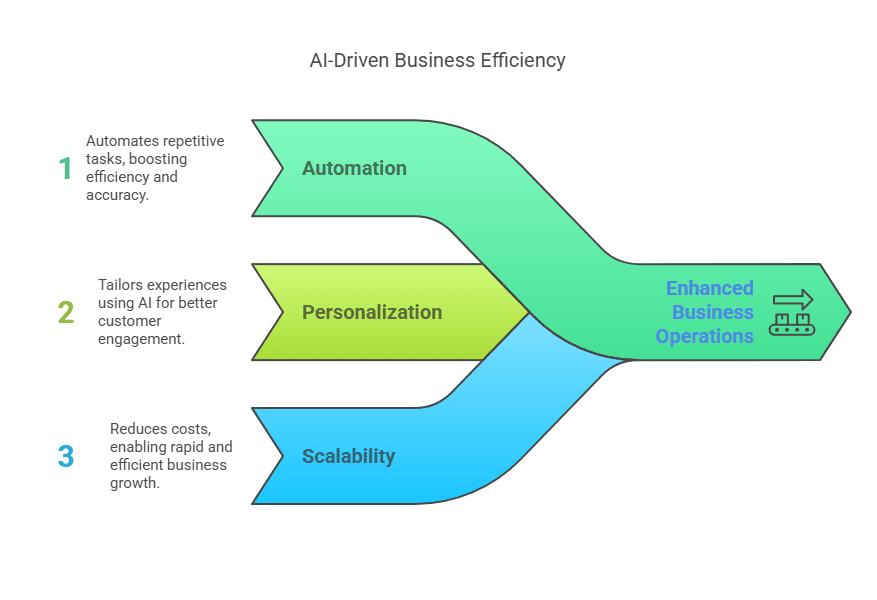
- Automation: AI empowers companies to automate repetitive duties, whether in finance (e.g., real-time transaction monitoring) or inventory management (especially in e-commerce).
- Personalization: By harnessing user data, AI-driven personalization tailors customer or patient experiences more effectively than traditional methods.
- Scalability: With AI, you can often reduce operational overhead. That’s thanks to algorithms that handle massive data sets, letting you expand more quickly without drastically inflating costs.
This reminds me of a point we’ve seen firsthand with our clients. A small business that introduced natural language processing chatbots to field customer service queries soared past its initial service capacity almost overnight. Beforehand, they needed costly human operators. After AI integration, they had new breathing room to focus on innovation, not just reactive support. That scenario underscores how even small AI additions can trigger big transformations.
AI in Healthcare Startups
Healthcare is among the most exciting frontiers for AI-based startups. Hospitals, clinics, and research centers generate huge volumes of data, including patient records, imaging scans, laboratory results, and more. Manually sifting through it becomes unmanageable—yet an AI model can find hidden insights in that sea of information.
How AI Benefits Healthcare

- Diagnostics and Imaging: Automated image analysis can spot tumors or disease patterns far earlier than the human eye. Startups in this area often use deep learning for classification and anomaly detection.
- Drug Discovery: AI assists in identifying potential drug candidate molecules faster. That’s particularly relevant during times of global health crises.
- Personalized Treatment: Machine learning algorithms can parse genetic data and lifestyle factors to suggest custom treatment plans.
Interestingly, if you’re new to this realm, consider exploring medical imaging as a simpler entry point. Hospitals already rely on imaging hardware. All that’s missing might be the software layer that analyzes MRI scans with machine-like precision. While many experts suggest building large datasets from scratch, in our experience, forging partnerships with biotech or medical institutions to access anonymized data works better. That approach gives you real-world samples and fosters trust from the start.
AI in Finance Startups
Finance stands out as another fertile ground for AI-driven models. Given the constant influx of financial transactions, the opportunities for machine learning solutions are immense. On the one hand, banks need sophisticated fraud detection systems. On the other, investment firms crave predictive analytics that can forecast market shifts.
Key Startup Opportunities in Finance
- Fraud Detection: Real-time monitoring of transactions to flag anomalies.
- Credit Scoring: AI-based credit risk assessment that uses alternative data, such as social media activity or past online behavior.
- Algorithmic Trading: Creating bots that automatically buy or sell securities based on historical data patterns and predictive modeling.
- Robo-Advisors: Digital platforms that manage investments or advise users on financial planning through AI algorithms.
You might wonder if finance startups need specialized regulatory frameworks. The answer is usually yes, but clearing those hurdles can set you apart. Compliance with financial authorities is part of building credibility, and your AI can also help streamline compliance tasks. If you’re contemplating an AI-based finance startup, take the first step by investigating partnerships with existing credit unions or banks that may invite innovative solutions.
AI in E-Commerce Startups
When it comes to e-commerce, consumers now demand personalized product recommendations, speedy customer service, and dynamic pricing that reflects real-time market conditions. AI meets these demands impressively.
E-Commerce Use Cases for AI
- Personalized Product Recommendations: By analyzing browsing behavior, AI can nudge customers toward products they are more likely to purchase.
- Inventory Management: Automated stock monitoring uses historical sales data to anticipate future demand.
- Chatbots and Virtual Assistants: Lower-level inquiries about orders or returns can be resolved in seconds through AI chat interfaces.
- Dynamic Pricing: Machine learning models can alter prices based on competitor shifts, time of day, or consumer demand patterns.
Ready to innovate in e-commerce? Consider exploring a niche solution that integrates with popular platforms like Shopify, WooCommerce, and BigCommerce. Or develop a brand-new platform that uses computer vision to allow customers to “try” products virtually. Actually, what I meant to say was that you can even introduce advanced AR-based (Augmented Reality-based) solutions for product visualization, which might be a step beyond typical AI in e-commerce but can differentiate your brand significantly.
AI in Education Startups
Educators increasingly rely on digital solutions to keep learners engaged. AI can be the secret sauce that makes education more interactive and tailored. Traditional approaches often apply the same pace to all students, but machine learning can identify specific weaknesses or strengths and adapt lessons accordingly.
How AI Can Reshape Education
- Adaptive Learning: Customized lesson plans that shift in difficulty based on the student’s performance.
- Virtual Tutors: Chatbots that respond to homework questions using natural language processing.
- Automated Grading: AI-based grading for multiple-choice and even short answer questions, saving teachers time.
- Predictive Analytics: Early warnings about potential dropouts or failing students, allowing educators to intervene proactively.
On a side note, one might argue the old-fashioned teacher-student relationship could be threatened by AI. While we can’t be entirely certain how the future of education will evolve, it’s likely that teachers will always play a critical role. AI just lightens their workload and highlights where each student needs the most attention.
Startup Fundamentals: Practical Steps to Success
Creating a thriving AI startup extends beyond having a brilliant product idea. Careful planning, choosing the right tech stack, and building a sustainable organizational model are equally vital. Contrary to popular belief, not all AI endeavors require massive computing clusters from day one. Smaller-scale MVPs (Minimum Viable Products) can be tested in the cloud or on more modest hardware—sometimes that’s enough to prove concept viability.
Steps to get rolling:
- Market Research: Identify the exact need you’re fulfilling. Are you solving a longstanding pain point, or are you just building AI for AI’s sake?
- Data Collection: Acquire relevant datasets. This could require partnerships with institutions, purchasing open datasets, or generating custom data.
- MVP Development: Start small. Apply a standard AI framework (TensorFlow, PyTorch) to validate your core concept quickly.
- Funding and Pitching: Early traction and proof of concept make your pitch stronger when approaching venture capitalists or angel investors.
- Regulatory Compliance: Healthcare or finance AI solutions might face privacy laws, financial guidelines, or HIPAA requirements.
- Scaling Up: Once you have a proven model, scale with robust infrastructure and consider advanced techniques like deep reinforcement learning.
Quick Comparison of AI Use Cases by Industry
Below is a simple (slightly rough) table comparing potential growth rates and audience potential in a few key industries to spark your own AI startup ideas.
| Industry | Potential Growth Rate (%) | Audience Potential |
|---|---|---|
| Healthcare (Diagnostics) | 45-60 (approx) | Growing demand for telemedicine |
| Finance – Fintech Services | 50+ | Soaring interest in automated tools |
| E-Commerce & Retail | 40+ | Large consumer adoption of AI |
| Education & E-Learning | 35 – 45 | Increasing acceptance of EdTech |
| Automotive – Self-Driving | 30 | Early but maturing marketplace |
(Note: Figures above are approximate ranges observed in various market analyses.)
If you’d like to move forward with an idea in any of these fields, consider exploring specialized sub-niches. You could, for example, focus on AI-driven personalization for medical device selection, or maybe an AI-based tutoring system for financial literacy. We’re available to help if you need guidance bridging technical concepts with real-world implementation.
A Brief Digression on AI’s Limitations
Have you ever looked at a predictive text tool and noticed how it sometimes spits out bizarre suggestions? This mild imperfection can be comedic in everyday life, but it’s a genuine concern when building mission-critical AI solutions. Many algorithms require enormous amounts of curated data. If your training data is incomplete or biased, your model’s results can veer off track. That’s an implementation challenge worth addressing early. Without a robust and well-structured pipeline, you risk generating subpar outcomes.
But fear not. In many situations, incremental improvements—like refining your feature set, re-checking training data, or adjusting hyperparameters—can iron out inaccuracies. Still, there’s no absolute guarantee that AI models will always behave as expected. That caution should motivate startups to create strong testing protocols, incorporate user feedback loops, and implement fallback mechanisms.
Counterintuitive Truth About Data Quality
A somewhat counterintuitive truth: sometimes smaller yet more curated data sets trump huge but messy ones. We’ve encountered scenarios where entrepreneurs believed piling on billions of data points would guarantee success. In reality, AI systems that rely on carefully labeled and domain-specific data often outperform those drowning in random inputs. So if you’re aiming for an AI startup and can’t gather massive volumes of information, consider carefully pruning and labeling what you can access. Quality often wins over quantity.
Future Outlook: AI’s Next Big Moves
Looking forward, the AI landscape is poised to expand into emerging disciplines like neuromorphic computing, quantum AI, and advanced generative models that produce near-human outputs in text, image, and video. While many of these technologies remain in early research phases, visionaries and entrepreneurs who position themselves to ride the wave of these transformations will be prepared for tomorrow’s breakthroughs. I’ve found that the key to success is anticipating how these developments might reshape your industry—and acting on that insight before everyone else.
In fact, let’s build on an earlier point about e-commerce personalization. As generative AI evolves, it won’t be shocking to see e-commerce sites that create custom promotional videos on the fly for each unique user. That sort of hyper-personalization might sound futuristic, yet the building blocks are already here. Businesses that want to remain competitive should keep an eye on these technologies and adapt quickly.
Frequently Asked (But Briefly Answered) Questions
Q: Are AI startups only for tech-savvy founders with deep data science skills?
Possibly not. Yes, technical knowledge helps, but you can also collaborate with AI developers and data scientists. Vision, domain expertise, and strong business insight are just as valuable.
Q: What sort of ROI can I expect from an AI startup?
There’s no universal figure, but many see substantial returns once they reach critical user adoption. Automated workflows and predictive analytics can significantly lower costs, leading to higher profit margins.
Q: How do I keep up with the pace of AI advancements?
Monitoring research publications, attending conferences, and consistently retraining your models goes a long way. Also, surrounding yourself with a community of AI experts and enthusiasts fosters ongoing learning.
Practical Pitfalls to Watch Out For
While AI offers tremendous promise, be aware of a few less obvious considerations. Data privacy is one. With GDPR and other regulations continuing to evolve, you need robust security measures to protect user information. Another subtle risk is the shortage of well-qualified AI talent. If you plan to launch rapidly, you might find stiff competition in recruiting top data engineers and scientists. Lastly, misalignment between your AI solution and real customer needs can stall even the most advanced technologies.
It’s often helpful for early-stage entrepreneurs to adopt an iterative process. Build a core model, test it with actual users, and only then incorporate advanced features. If you attempt to accomplish everything at once, you’ll risk spreading your resources thin. While many experts claim the biggest leaps happen when you go huge from the get-go, we’ve seen this firsthand in our clients’ experiences—small, focused sprints can be more effective for consistent improvements.
One Unexpected Angle: AI for Monitoring Supply Chains
Now let’s pivot abruptly to something that might at first sound off-topic but is actually relevant to AI’s potential: supply chain management. This area can be a real headache for growing businesses. Everything from raw material sourcing to on-time delivery can be optimized with AI-driven analytics. By predicting demand fluctuations, detecting possible bottlenecks, and streamlining logistics, AI-based supply chain solutions reduce waste and speed up delivery times. Suddenly, a small startup tackling supply chain inefficiency might land enormous contracts with multinational corporations. So if you’re an entrepreneur searching for a less saturated niche, supply chain analytics is ripe for innovation. Then again, incorporate real-time IoT data, and you have a recipe for an incredibly effective system that outperforms old standard software.
Calls to Action for Aspiring AI Entrepreneurs
If you’re feeling inspired to start something in this arena, consider exploring specialized AI-based solutions that fit your existing skill sets. Don’t hesitate to connect with domain experts in healthcare, finance, e-commerce, or education to gauge their pain points—real-world feedback can refine concepts drastically.
Another step you might take is to partner with technology consultancies or AI labs that can guide you through the complexities of model development and data pipeline design. We’re always open to sharing insights on bridging the gap between concept and execution. You could also dive into smaller pilot projects before committing to a full-scale launch. That approach helps you validate your ideas with minimal capital risk.
For those ready to go further, think about applying for government grants or programs often aimed at innovative AI research. And if that route feels cumbersome, perhaps look for specialized accelerators dedicated to AI-driven startups. These micro-communities can provide both funding and valuable mentorship. Soon enough, you’ll have the foundation to either branch out on your own or attract major investors.
A Note on Imperfect Transitions
By the way, let’s shift for a moment to user adoption timelines. Rolling out an AI solution typically takes more than flipping a switch. Organizations must train their staff, tweak their processes, and measure results carefully. While you might build the best algorithm on the planet, it won’t truly shine if end-users aren’t prepared to integrate it seamlessly. And that readiness is an essential consideration for any budding founder.
Wrapping Up: Charting a Path to AI-Driven Success
As you take your first steps into the world of AI startup ideas, remember that success comes from blending strong market research, solid data-driven insights, user-friendly design, and impeccable deployment strategies. Regardless of the industry—healthcare, finance, e-commerce, or education—AI can offer transformative benefits: automation, personalization, and cost efficiency, all at a scale rarely seen with legacy technologies. Even if the road to adoption has twists and turns, the potential upside is tremendous.
Take the first step by tying your AI concept closely to a genuine market need. Then test your hypothesis early with a pilot group or minimal viable product. If you need more confidence in your approach, we’re here to share our experiences in designing scalable AI solutions with real-world impact. Don’t hesitate to refine your plan after every iteration—it’s part of the journey. And keep an eye on emerging subfields that could shape the future, such as generative AI, neuromorphic hardware, and advanced analytics frameworks that keep evolving at breakneck speed.
Ultimately, a bit of well-channeled ambition can open up massive opportunities when it comes to AI in healthcare startups, AI in finance startups, AI in e-commerce startups, and even education. If you remain diligent, continue learning, and collaborate with the right partners, your AI-driven personalization or automation tool might just be the next big thing to disrupt the market.
Blocktech Brew has deep expertise turning these AI startup ideas into tangible, scalable solutions. We help entrepreneurs transform innovative concepts into robust AI-powered business models, taking care of everything from data management to deployment. Our team stays alert to industry changes, making sure your venture remains future-focused. Reach out anytime to explore how we can support you in carving your niche in this rapidly evolving AI landscape.






